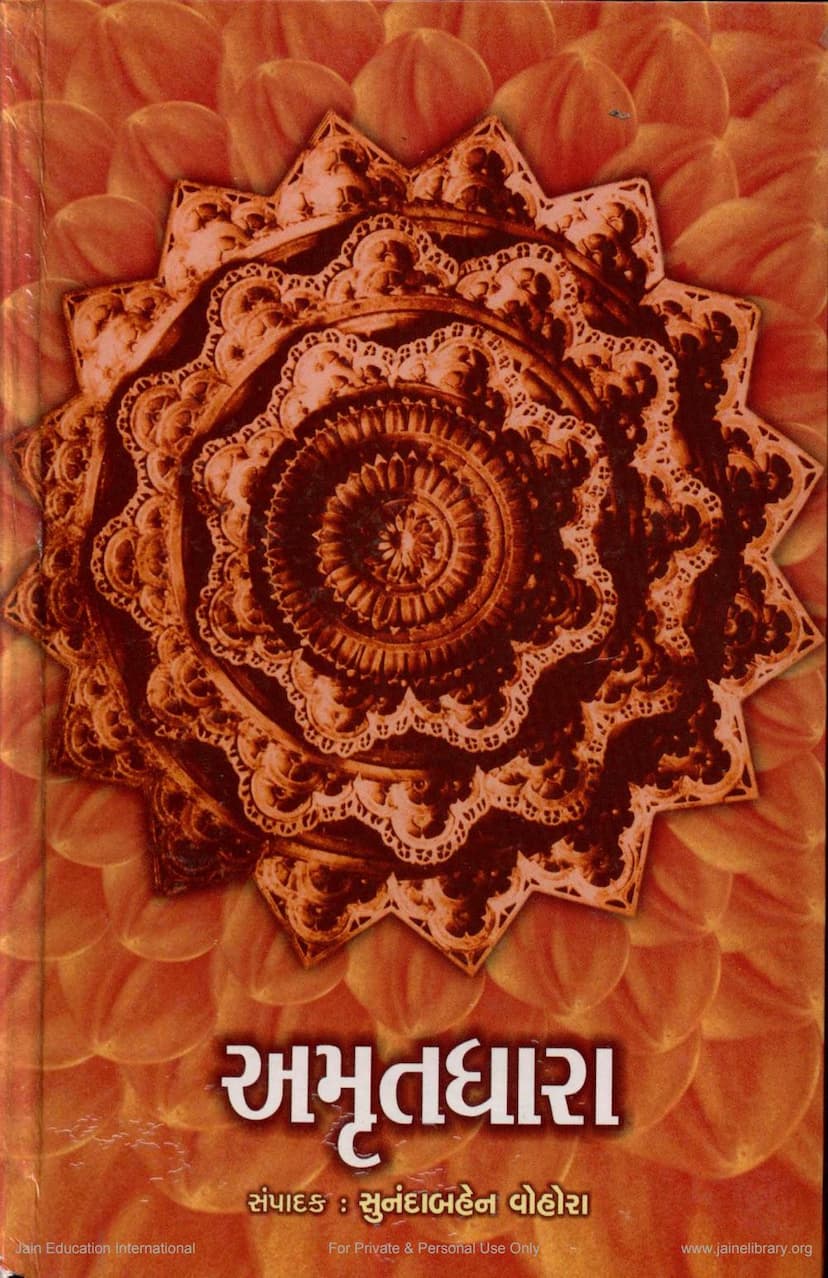Amrutdhara
Added to library: September 1, 2025

Summary
This document is the text of "Amrutdhara" (The Stream of Nectar), a Jain scripture compiled and edited by Sunandaben Vohra. The book was published by Anandsumangal Parivar in America and had its first edition in January 2004.
Overall Summary:
"Amrutdhara" is a collection of spiritual insights and teachings derived from various Jain scriptures (both Shvetambara and Digambara traditions) and also includes select Jain literature and even some non-Jain texts that resonate with Jain philosophy. The editor, Sunandaben Vohra, states that the work is not based on a single school of thought but aims to present valuable spiritual knowledge accessible to a wider audience, particularly acknowledging the Indian diaspora in countries like America.
The book's title, suggested by Acharya Shri Vijay Pradyumnasurishwarji, implies a continuous flow of spiritual essence, likened to nectar. The compilation consists of 1008 sentences, symbolizing the virtues of the Pancha Parmeshthis. The editor emphasizes that the text is deeply rooted in spirituality and self-realization.
Key Themes and Concepts:
The text delves into various profound aspects of Jain philosophy, with a recurring focus on:
- The Nature of the Soul (Atman): The book extensively explores the soul's inherent purity, its eternal nature, and its potential for liberation. It distinguishes between the soul's true, unchanging essence and its temporary states influenced by karmas and external factors.
- Karma and Liberation: A significant portion discusses the concept of karma, its bondage, and the paths to liberation (moksha). It emphasizes the importance of right faith (samyak darshan), right knowledge (samyak gnan), and right conduct (samyak charitra) – the Three Jewels – as the means to break free from the cycle of birth and death.
- Detachment and Non-attachment: The text consistently promotes detachment from worldly possessions, relationships, and even the body, emphasizing that true happiness lies in self-realization and freedom from external dependencies.
- Mind Control and Inner Awareness: A central theme is the control of the mind, its constant fluctuations, and the need to redirect its focus inward. Techniques like meditation and contemplation are implicitly or explicitly encouraged to achieve mental stillness and self-awareness.
- The Importance of Right Perspective (Nishchay and Vyavahar Naya): The text often highlights the dual perspectives of Absolute Truth (Nishchay Naya) and Conventional Truth (Vyavahar Naya), explaining how both are necessary for spiritual progress and understanding the ultimate reality.
- Virtuous Conduct and Renunciation: The teachings advocate for ethical living, non-violence (ahimsa), truthfulness, non-stealing, celibacy, and non-possession (the five vows). While external actions are acknowledged, the emphasis is on the inner intention and spiritual transformation.
- The Role of the Guru: The text acknowledges the vital role of a spiritual guide (Guru) in leading the seeker towards self-realization and understanding the subtle nuances of spiritual paths.
- The Essence of Spirituality: The ultimate goal is presented as the realization of the soul's pure, blissful, and omniscient nature, free from all karmic impurities and worldly illusions.
Structure and Style:
The book is structured as a compilation of teachings, often presented in a concise and aphoristic style. It draws upon the wisdom of various learned souls and ancient texts. The language is Gujarati, aiming to be profound yet accessible, guiding the reader through complex spiritual concepts with clarity. The editor's introductory notes and the blessings from respected Acharyas set a spiritual tone for the work.
In essence, "Amrutdhara" serves as a spiritual guide, offering a rich tapestry of Jain philosophical thought to help readers navigate their spiritual journey, cultivate inner peace, and ultimately move towards self-realization and liberation.